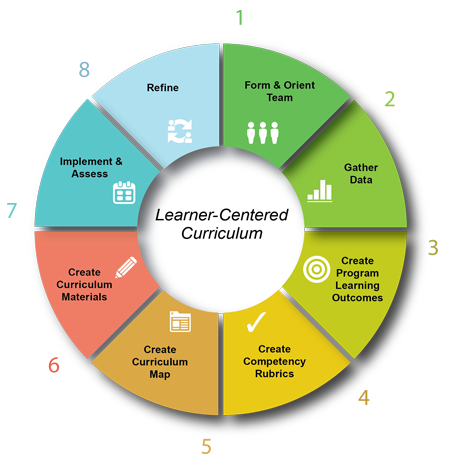Program Design Support
To facilitate the process of designing a learner-centered curriculum we use the Program (Re)Design Model below (Fowler, et al., 2016). This faculty-led process brings together pedagogical experts and disciplinary experts as well as educational technology experts to create a data-informed curriculum that places student learning at the center. Programs designed using this comprehensive model are well-positioned for the accreditation process.

The drawers below expound on each step of the program design cycle.
 Program (Re)Design Model for a Learner-Centered Curriculum 2015 (updated April 26, 2018), created by Debra Fowler, Ph.D., Center for Teaching Excellence, Texas A&M University, is licensed under a Creative Commons Attribution-NonCommercial-ShareAlike License.
Program (Re)Design Model for a Learner-Centered Curriculum 2015 (updated April 26, 2018), created by Debra Fowler, Ph.D., Center for Teaching Excellence, Texas A&M University, is licensed under a Creative Commons Attribution-NonCommercial-ShareAlike License.
Form & Orient Team
- Constitute the development team (instructional support experts, i.e., instructional designer, instructional technologist, student academic support professional, media expert, assessment expert, librarian) that will support faculty and other subject matter experts
- Develop timeline
Gather Data
- Data sources offering evidence
- Internal: student surveys; instructor surveys; focus groups; define perspective of
discipline - External:
review of peer institutions; alumni feedback; employer focus groups and surveys; job descriptions; accreditation/certification requirements
- Internal: student surveys; instructor surveys; focus groups; define perspective of
- Identify
target audience - Determine program/course type: credit/non-credit, certificate, micro-master, master, stackable courses
Create Program Learning Outcomes
- Program Goals are broad statements identifying learning parameters, content
and relationships between content areas – what students should learn, understand, or appreciate as a result of their studies by the time they finish a program or a major. - Student Learning Outcomes (SOL) describe in concrete terms what program goals mean. SLO statements identify what students will be able to demonstrate, produce or represent as a result of what and how they have learned in a program. Unlike program goals, SLO’s are not fixed. Assessment results will then be used to make required changes in the curriculum, pedagogies, faculty professional development, student support, or resource allocation. Learning outcomes too could be revised, modified or changed for a subsequent assessment cycle, etc., etc.
For additional information, visit the Program Goals and Learning Outcomes page or the Program Level Assessment page.
Create Competency Rubrics
Competency Rubric: Once program learning outcomes (
- Example: Capstone Rubric WASC
Create Curriculum Map
Curriculum mapping identifies where the program learning outcomes are introduced (I), reinforced (R), strengthened (S) and/or demonstrated (D). Courses are listed across the top of the map and outcomes along the side. The center of the map is completed by determining which courses/experiences will support the I, R, S, and/or D of each program learning outcome.
Create Curriculum Materials
- Identify teaching modalities best suited for fulfilling the identified learning goals
- Identify and develop specific teaching strategies (incl. instructional technology tools, media tools, etc.) best suited for student learning and engagement
- Develop an assessment plan that answers these three questions:
- Which student learning outcomes will you assess?
- What evidence will you collect to determine learning effectiveness and gaps?
- How will you use the information to improve your program?
- See the following examples:
- WASC provides a useful sample matrix: WASC Sample Matrix for Assessment Plan
Implement & Assess
- Collect learning data (including learning analytics) for formative assessment
- Adjust and fine-tune based on assessment feedback
Refine
- Ongoing assessment will ensure that curriculum decisions are implemented effectively.
Fowler, D., *Bakenhus, C., Kothmann, *M., Macik, M., Poling, N., & *MacWillie, S. (2016). Redesigning natural resources curricula: A redesign process model at Texas A&M University. Natural Sciences Education.
Rogers, K., Green, E., Chaney, K., Macik, M., Turner, J., Keefe, L., Scallan, B., Korich, J., & Fowler, D. (2016). Beyond the AVMA-COE clinical competencies: Preparing future veterinarians. Journal of the American Veterinary Medical Association.
Fowler, D. A., & *Macik, M. L., & Kaihatu, J., & *Bakenhus, C. A. H. (2016). Impact of Curriculum Transformation Committee Experience on Faculty Perspectives of their Teaching and its Influence on Student Learning Paper presented at 2016 ASEE Annual Conference & Exposition, New Orleans, Louisiana. 10.18260/p.25538
Fowler, D., *Macik, M. L., Sandoval, C., *Bakenhus, C., & *MacWillie, S. (2016). Program (re)design model: A sustainable, system-level approach to faculty development. Journal of Faculty Development.
Fowler, D., *Lazo, M., *Turner, J., *Hohenstein, J (2015). Facilitating Program, Faculty, And Student Transformation: A Framework For Curriculum Redesign. Journal of Transformational Learning. 3(1).
Brumbelow, J., Fowler, D., Morgan, J., & Anthony, W. (2015) Transformation of a Large Civil Engineering Department Curriculum Using the ASCE BOK2. 122nd Annual Conference and Expedition, Seattle, WA.
Fowler, D., Anthony, W., Poling, N., Morgan, J., and Brumbelow, J. (2014). Data-driven Curriculum Redesign in Civil Engineering. Paper accepted for 44th American Society for Engineering/Institute of Electrical and Electronics Engineers (ASEE/IEEE) Frontiers in Education Conference, Madrid, Spain.
Jarvis, H. D., Collett, R., Wingenbach, G., Heilman, J. L., & Fowler, D. A. (2012). Developing a foundation for constructing new curricula in Soil, Crop and Turfgrass Sciences. Journal of Natural Resources and Life Sciences Education, 41, 7-14.
Fowler, D. A., Froyd, J. E., & Layne, J. (2010). Curriculum redesign: Concurrently addressing content mastery and development of cognitive abilities. Proceedings of the 40th American Society for Engineering/Institute of Electrical and Electronics Engineers (ASEE/IEEE) Frontiers of Education Conference, Washington, D.C.